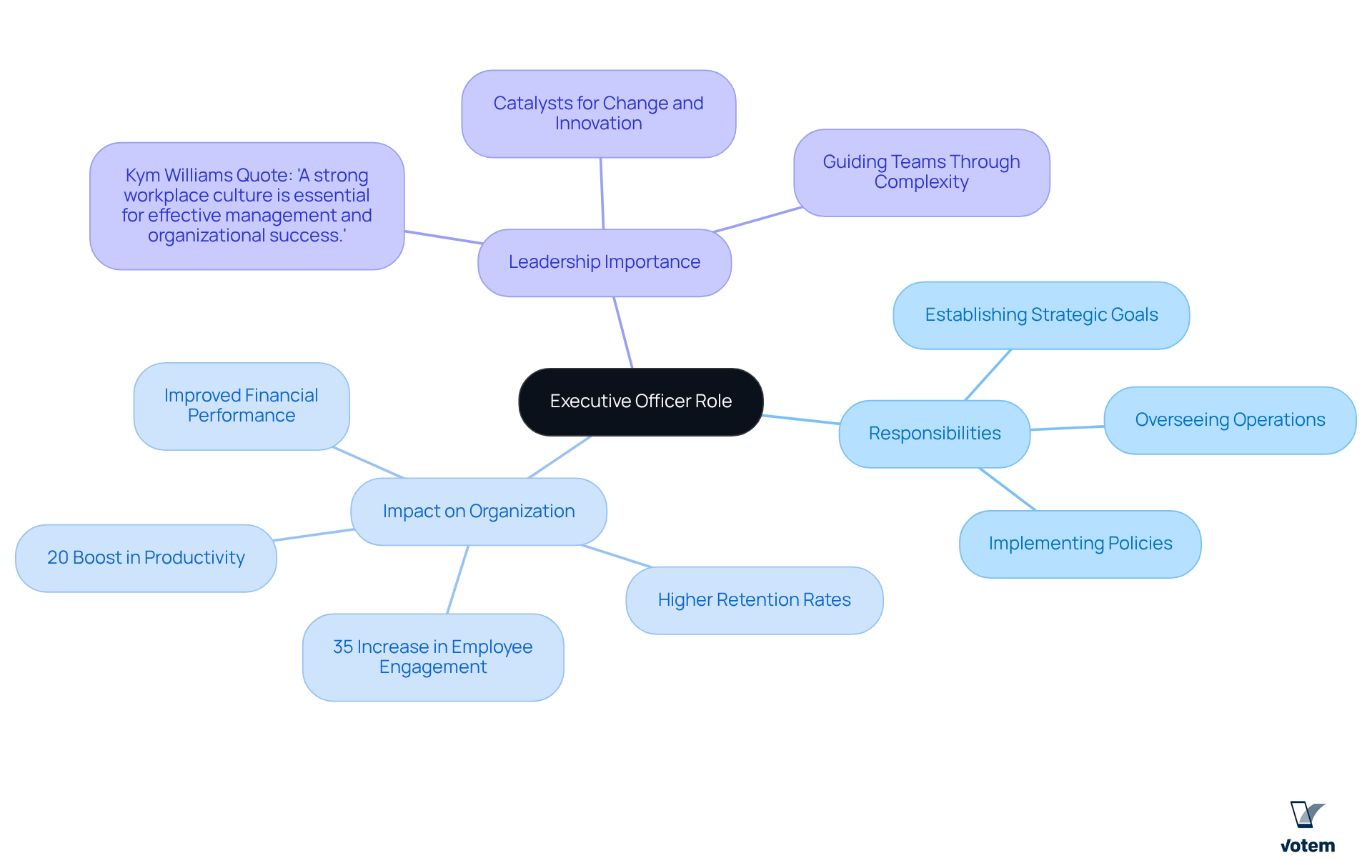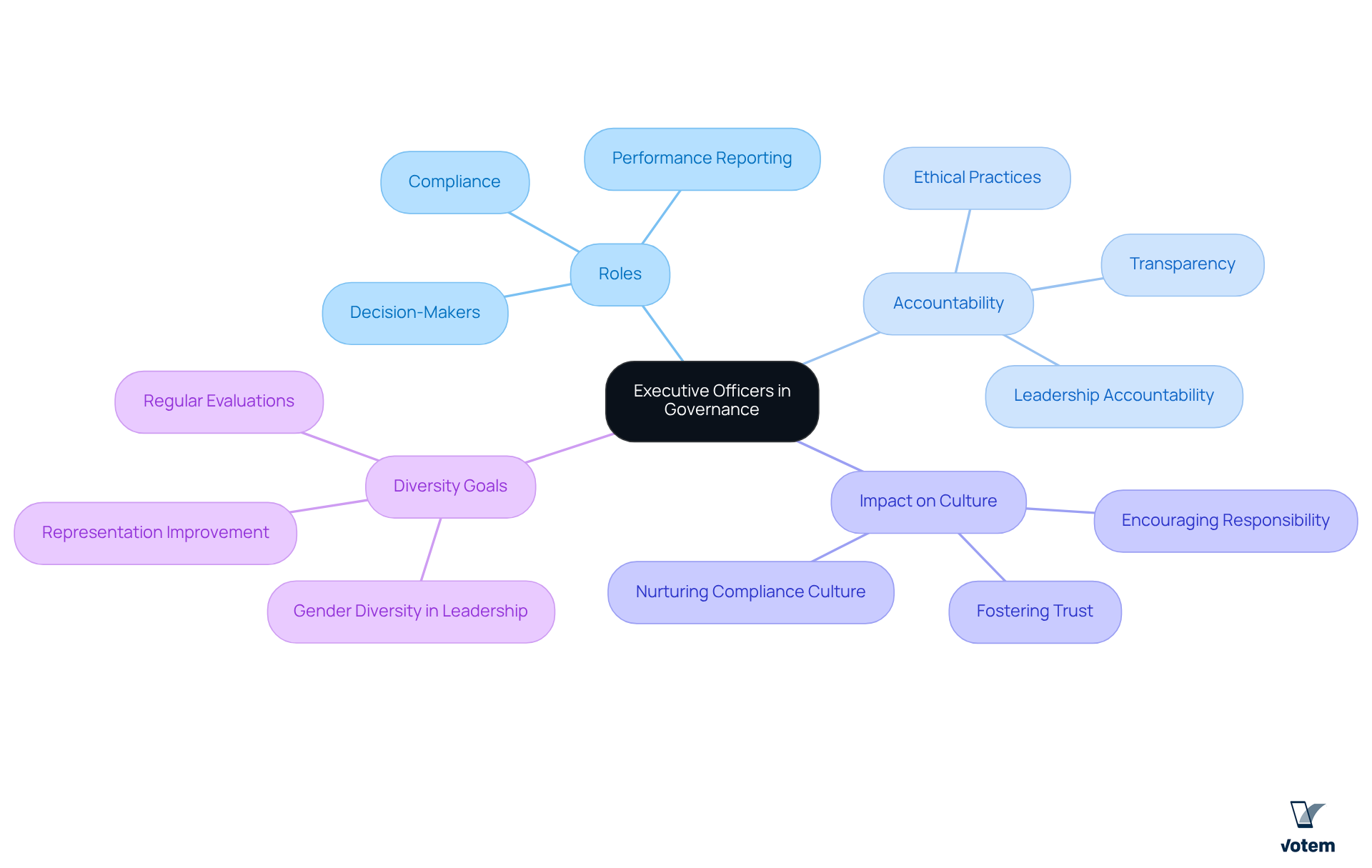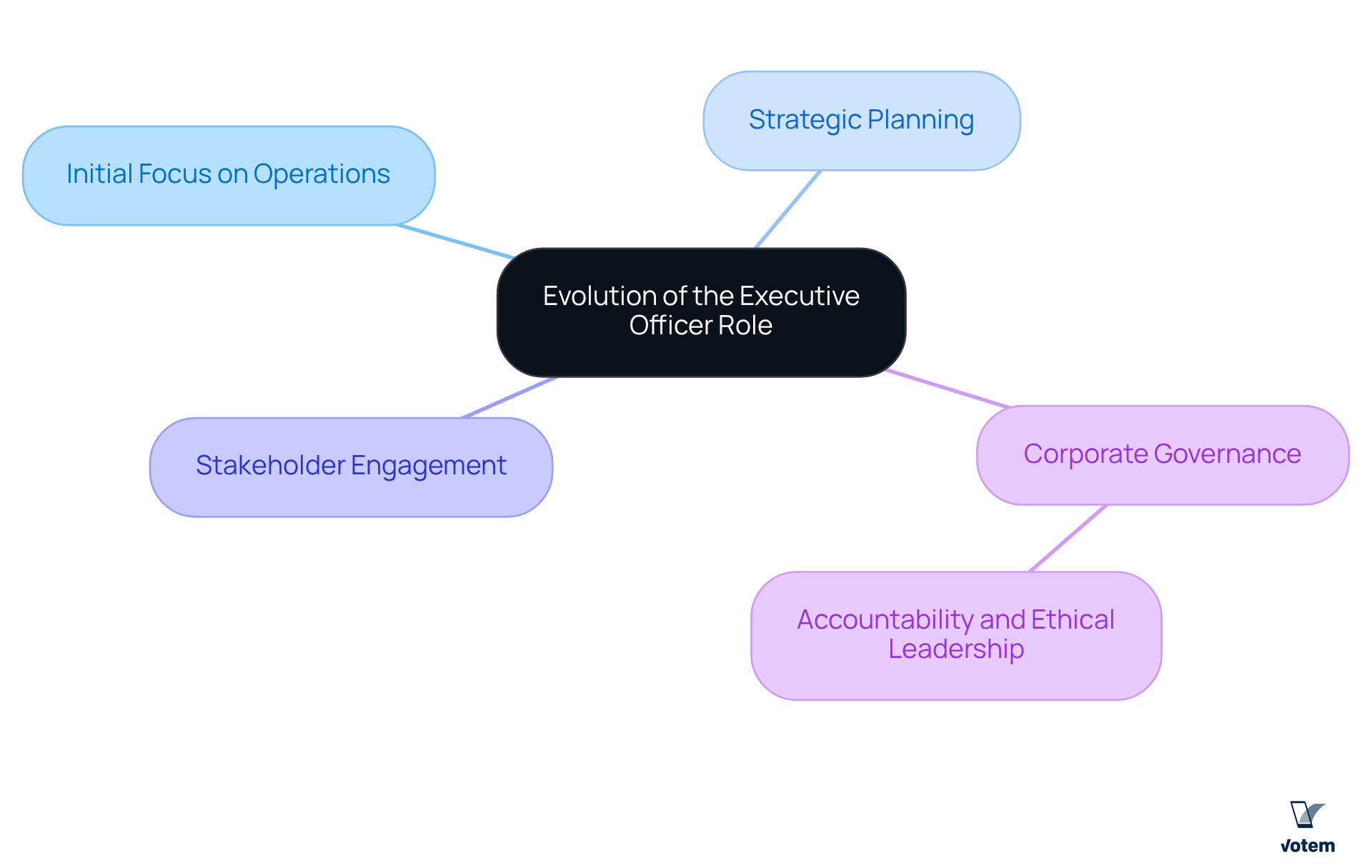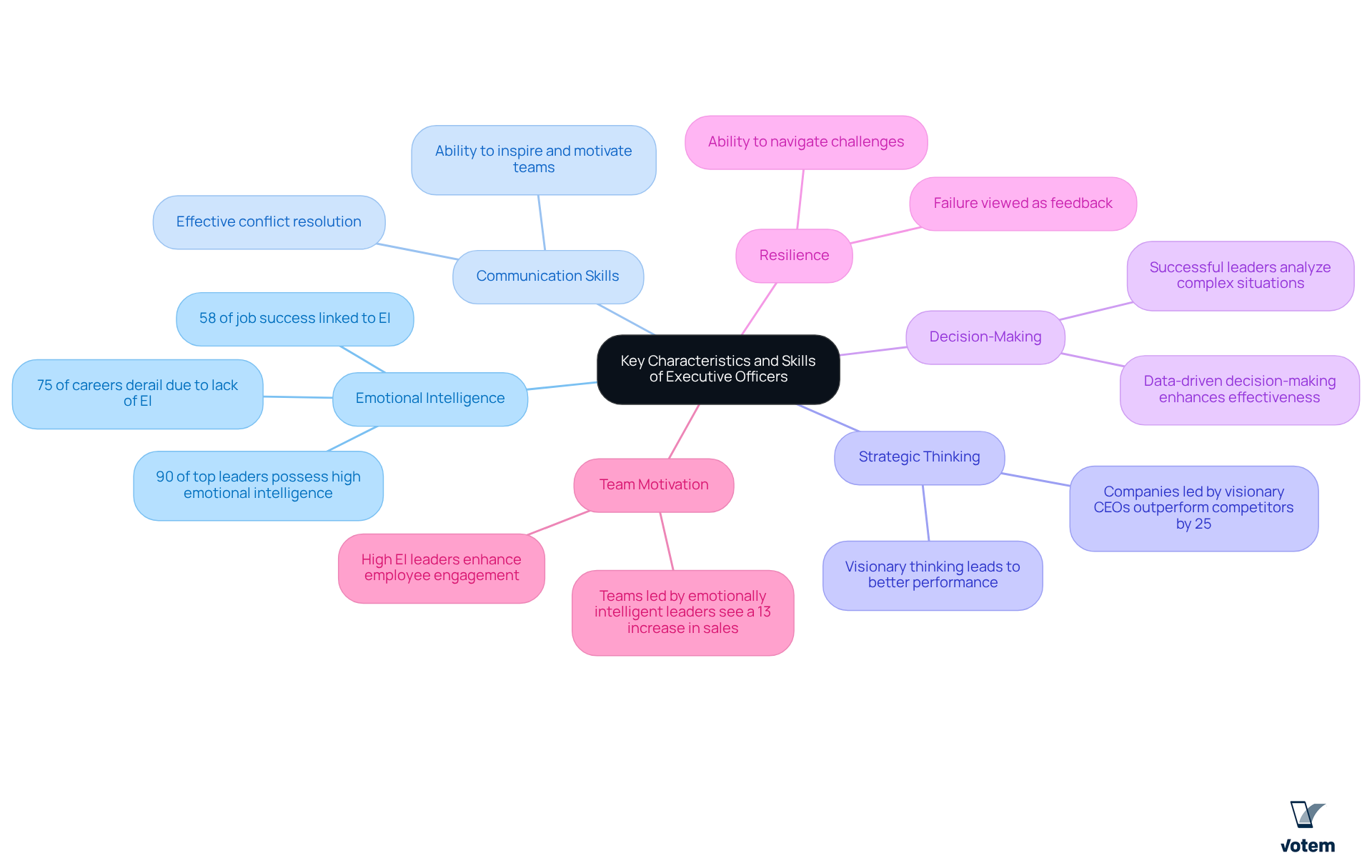Overview
The article delves into the pivotal role of an executive officer, underscoring their essential responsibilities in steering organizational strategy, ensuring compliance, and cultivating a positive workplace culture. Effective leadership is crucial—characterized by skills such as emotional intelligence and strategic thinking. These attributes not only drive employee engagement but also significantly contribute to organizational success.
Statistics reveal the substantial impact that strong leadership has on performance metrics, reinforcing the necessity of competent leadership in today’s dynamic environment.
Furthermore, the article highlights that executive officers must navigate various challenges while fostering a culture that promotes collaboration and innovation. By embracing these responsibilities, they can create an environment that empowers employees, ultimately leading to enhanced productivity and morale. The connection between leadership effectiveness and organizational outcomes is clear, as evidenced by numerous case studies and testimonials that illustrate the transformative power of strong leadership.
In conclusion, it is imperative for union leadership to recognize the importance of executive officers in shaping the future of their organizations. By prioritizing leadership development and fostering a culture of engagement, they can drive meaningful change and ensure long-term success. This understanding serves as a call to action for union leaders to invest in their leadership capabilities, paving the way for a more resilient and thriving workplace.
Introduction
Understanding the role of an executive officer is essential for grasping the dynamics of effective organizational leadership. These pivotal figures not only steer the strategic direction of a company but also embody the values and culture that drive success. As businesses navigate an increasingly complex landscape, one must consider: what specific skills and characteristics make an executive officer truly effective?
Delving into this topic reveals the critical responsibilities they hold, the impact they have on corporate governance, and the evolving nature of their role in today’s fast-paced environment. Furthermore, recognizing these elements is crucial for union leadership aiming to foster effective governance and drive organizational success.
Define Executive Officer: Role and Responsibilities
To understand what is an executive officer, one must recognize the crucial role they play within a company, guiding its overall direction and management. This position, which answers the question of what is an executive officer, encompasses a wide array of responsibilities, including the establishment of strategic goals, implementation of policies, and oversight of daily operations. Understanding what is an executive officer is vital for executive leaders to ensure that the organization not only meets its objectives but also adheres to legal and ethical standards. They serve as a critical link between the board of directors and operational staff, which raises the question of what is an executive officer in facilitating effective communication and decision-making processes. Their guidance significantly influences the entity’s culture and strategic direction, which raises the question of what is an executive officer and why they are indispensable to its success.
Statistics underscore the importance of senior managers: organizations with robust leadership experience a 35% increase in employee engagement and a 20% boost in productivity. Furthermore, case studies reveal that organizations with effective leaders enjoy higher retention rates and improved financial performance. For instance, the Executive Development Program reported an 85% employee retention rate and a Net Promoter Score of 92%, highlighting the positive impact of effective management on organizational success.
Leadership specialists assert that the role of senior leaders extends beyond mere administration; they are catalysts for change and innovation. Kym Williams, Managing Director of BRS Results, states, “A strong workplace culture is essential for effective management and organizational success.” Their ability to inspire and guide teams is crucial for navigating the complexities of modern business environments. As organizations face increasing challenges, it is essential to understand what is an executive officer in shaping strategic initiatives and fostering a positive workplace culture. This emphasizes the need for clear guidelines and procedures for leadership elections and role selection, ensuring that the right individuals are positioned to lead effectively.

Contextualize Executive Officers in Organizational Governance
In the context of corporate governance, understanding what is an executive officer is crucial, as these leaders play a pivotal role as key decision-makers who shape the strategic direction of their organizations. They carry substantial accountability to the board of directors, ensuring compliance with relevant laws and regulations. In this capacity, senior leaders are tasked with reporting performance metrics and strategic initiatives, fostering a culture of transparency and accountability. Their leadership not only aligns with the interests of employees and stakeholders but also fortifies ethical practices within the organization.
This governance framework highlights what is an executive officer’s critical importance in maintaining organizational integrity and driving long-term success. Effective leadership is essential for cultivating a robust compliance culture, as their actions set the tone for ethical conduct throughout the organization. Furthermore, organizations that implement strong leadership accountability mechanisms report elevated levels of compliance and ethical behavior, illustrating the profound impact these leaders have on nurturing a responsible organizational environment.
Consider this: only 38% of organizations have established gender diversity goals for their leadership teams, signifying a substantial opportunity for improvement in accountability and representation. Moreover, case studies reveal that regular evaluations and adjustments of governance practices are vital for ensuring adherence to evolving legal standards, further accentuating the role of senior management in this endeavor. As Colin Powell aptly stated, ‘Accountability breeds response-ability,’ highlighting the imperative for leaders to embody ownership and responsibility in their roles.

Trace the Evolution of the Executive Officer Role
The role of the chief has undergone significant evolution over the years, adapting to changes in organizational frameworks, market dynamics, and regulatory environments. Initially, senior leaders focused primarily on operational management. However, as organizations grew in complexity, their responsibilities expanded to include:
- Strategic planning
- Stakeholder engagement
The emergence of corporate governance frameworks in the late 20th century further reshaped this role, highlighting the need for accountability and ethical leadership.
In today’s fast-paced environment, senior leaders are expected to adeptly navigate a landscape marked by rapid technological advancements and evolving societal expectations. This shift underscores the necessity for adaptability and foresight, which are essential for achieving organizational success. As union leaders, recognizing these changes is vital for fostering effective leadership that meets contemporary challenges head-on.

Identify Key Characteristics and Skills of Executive Officers
Capable leaders embody a unique mix of skills and qualities that enable them to guide organizations successfully. Strong communication skills, strategic thinking, and emotional intelligence stand out as critical components of effective leadership. Research indicates that 90% of top leaders possess high emotional intelligence, significantly enhancing their ability to connect with teams and drive performance. Furthermore, it is significant that 75% of careers falter due to insufficient emotional intelligence, highlighting its essential requirement in managerial positions. Understanding what is an executive officer is crucial, as decision-making prowess is another vital trait; successful executive officers excel at analyzing complex situations and making informed choices that align with organizational goals.
Resilience and adaptability are equally important, enabling leaders to navigate challenges and implement necessary changes. Jack Welch’s philosophy that ‘failure should be viewed as feedback rather than a fatal setback’ emphasizes the importance of resilience in guiding others. The ability to inspire and motivate teams fosters a positive organizational culture, enhancing employee engagement and productivity. Notably, teams led by emotionally intelligent leaders experience a 13% increase in sales, and companies with emotionally intelligent CEOs earn 5% more than those without, underscoring the tangible financial benefits of these leadership traits.
In summary, understanding what is an executive officer involves recognizing that the blend of emotional intelligence, effective communication, strategic decision-making, and resilience is essential for achieving organizational objectives and cultivating a thriving workplace. As Brian Tracy aptly states, ‘Become the kind of leader that people would follow voluntarily, even if you had no title or position.

Conclusion
Understanding the role of an executive officer is essential for grasping how organizations operate and thrive. This position transcends mere oversight; it embodies strategic leadership that drives a company’s vision and ensures that it meets its goals while adhering to ethical standards. The executive officer serves as a critical bridge between the board and operational teams, facilitating communication and decision-making that shapes the organization’s culture and strategic direction.
Key points throughout the article emphasize the significant impact of effective leadership on employee engagement, productivity, and retention rates. The evolution of the executive officer role reflects a shift from traditional management to a more dynamic approach that encompasses strategic planning and stakeholder engagement. Moreover, essential skills such as emotional intelligence, resilience, and strategic decision-making are crucial for navigating the complexities of modern business environments.
In light of these insights, the importance of fostering strong executive leadership cannot be overstated. Organizations must prioritize developing leaders who embody these qualities to drive accountability, ethical practices, and long-term success. By investing in leadership development and embracing the evolving nature of executive roles, companies can position themselves to meet contemporary challenges and create a thriving workplace culture that benefits everyone involved.
Frequently Asked Questions
What is the role of an executive officer?
An executive officer plays a crucial role within a company by guiding its overall direction and management, establishing strategic goals, implementing policies, and overseeing daily operations.
Why is understanding the role of an executive officer important?
Understanding the role of an executive officer is vital for ensuring that the organization meets its objectives while adhering to legal and ethical standards.
How do executive officers facilitate communication within an organization?
Executive officers serve as a critical link between the board of directors and operational staff, facilitating effective communication and decision-making processes.
What impact do effective executive officers have on an organization?
Effective executive officers influence the entity’s culture and strategic direction, leading to increased employee engagement, productivity, higher retention rates, and improved financial performance.
What statistics highlight the importance of strong leadership?
Organizations with robust leadership experience a 35% increase in employee engagement and a 20% boost in productivity. Additionally, effective leaders contribute to higher retention rates and better financial outcomes.
How do executive officers contribute to workplace culture?
Executive officers are catalysts for change and innovation, and their ability to inspire and guide teams is essential for fostering a positive workplace culture.
What is the significance of leadership elections and role selection?
Clear guidelines and procedures for leadership elections and role selection are essential to ensure that the right individuals are positioned to lead effectively and navigate the complexities of modern business environments.
List of Sources
- Define Executive Officer: Role and Responsibilities
- Case Studies | CEO Interviews | Business Case Studies | Business Case Study | Management Case Studies | Case Studies in Business | Case Studies in Management – IIDM Global (https://iidmglobal.com/case_studies)
- Paycor’s Story: Creating Visionary Leaders in a Rapidly Expanding Organization – Bluepoint Leadership Development (https://bluepointleadership.com/case_studies/paycors-story-creating-visionary-leaders-in-a-rapidly-expanding-organization)
- Contextualize Executive Officers in Organizational Governance
- Quotations from Chairman Powell: A Leadership Primer – Colin Powell Leadership (https://govleaders.org/powell.htm)
- Corporate Governance at Unilever | Corporate Administration | Corporate Governance | Case Study | Case Studies (https://ibscdc.org/Case_Studies/Corporate Governance/Corporate Governance/Corporate Governance at Unilever – Excerpts.htm)
- Corporate governance (https://diligent.com/resources/guides/corporate-governance)
- Powerful Accountability Quotes for Personal and Professional Growth (https://effy.ai/blog/accountability-quotes)
- 100 Interesting C-Suite Facts and Statistics [2025] (https://digitaldefynd.com/IQ/interesting-c-suite-facts-and-statistics)
- Identify Key Characteristics and Skills of Executive Officers
- Top 10 leadership traits every c-suite executive needs to master (https://c-suite-strategy.com/blog/top-10-leadership-traits-every-c-suite-executive-needs-to-master)
- Words to Live & Work By: The C-Suite’s Favorite Leadership Quotes (https://shrm.org/executive-network/insights/words-to-live-work-c-suites-favorite-leadership-quotes)
- Emotional Intelligence Impact Statistics: Key Findings (https://zoetalentsolutions.com/emotional-intelligence-impact-statistics-key-findings)

